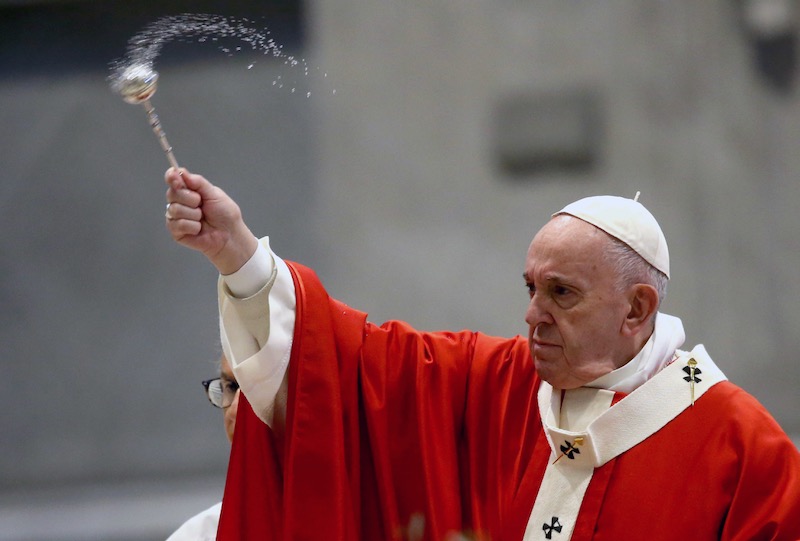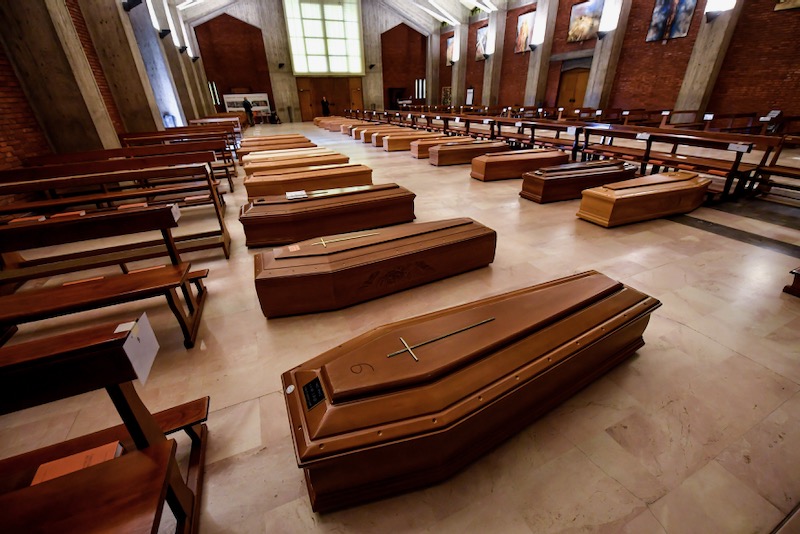A Trappist monastery in America is offering handmade wooden caskets free of charge to families in need impacted by the coronavirus outbreak.
New Melleray Abbey, a Trappist monastery located near Dubuque, Iowa, has announced that they will be offering “financially stressed families directly impacted by the Covid-19 virus” coffins free of charge for as long as their current inventory lasts.
The Trappists, officially known as the Order of Cistercians of the Strict Observance, emphasise manual labour in their spiritual life, with members spending roughly half their time working.
The New Melleray community, founded in 1849, has been building caskets for over two decades, taking advantage of the extensive forests around their monastery, which stretch to more than 1300 acres of land.
Last year, the monks shipped around 1650 caskets throughout the United States.
The announcement comes at a time when millions of Americans have had their lives and finances disrupted by the impact of the coronavirus outbreak.
Over the past two weeks 9.95 million Americans have filed for unemployment benefits, and the rate of unemployment has soared from 3.5 per cent in February to an estimated 17 per cent at present, the fastest rise in history.
Last week, the World Bank warned that more than 35 million people worldwide could be driven into poverty as a result of the coronavirus pandemic.
Speaking to The Tablet, Brother Paul Tanner, a monk at the Abbey, said that the community’s offer of caskets was a response to the “new world” that the coronavirus outbreak has created.
Tanner, who has been a member of the community for 21 years, went on: “We know that there are families who have lost loved ones from the virus who have limited resources.”
Offering coffins to those families was, Tanner added, “a corporal work of mercy”.
Gregory Hillis, an associate professor of theology at Bellarmine University and the author of a forthcoming book on Trappist spiritual writer Thomas Merton, said the monastery’s decision was part of a tradition of concern for the world.
The monks, Hillis said, “recognise that the life they live, while separated from the world, doesn’t mean that they are separated from the affairs of the world.”
As in the case of Merton, a monk at Gethsmani Abbey who became passionately involved in the civil rights and peace movements of his time, Hillis said there was an intimate link between the New Melleray community’s spiritual life and action in service of the “Common Good”.
A life of prayer, Hillis argued, “should naturally lead to a deeper love of God and neighbour, and the monks at New Melleray are demonstrating concretely what this kind of love can look like”.
The Abbey’s life of “praise and prayer” has not been left unaffected by the spread of the coronavirus in the US, where nearly 10,000 Americans have died of the virus and over 337,000 have been infected.
Masses, normally open to neighbors and friends of the Abbey, are now closed to those who aren’t members of the community; the Monastery’s 22-person Guesthouse, normally home to retreat-goers, guests and other visitors, has closed its doors indefinitely.
In spite of this, Dr Hillis, who knows the New Melleray community well, believes that the spirituality of the community’s Trappist tradition has a special relevance in a time when many people are experiencing enforced solitude.
“The monks have much to teach us about what it means to live in solitude”, Hillis said, “and so what it means to be confronted with who we really are, apart from the distractions that are normally part of our existence”.
In communities like New Melleray Abbey, Hillis added, "there is a strong sense that each monk’s well-being is tied to the well-being of the community as a whole”, especially when community members approach death. Beyond the caskets, Hillis argued that the Trappist tradition has “something important to say” on living – and dying – in these unusual times.



 Loading ...
Loading ...